Brondesbury eruv requires West Hampstead poles
The Brondesbury Park Synagogue has put in a planning application to erect pairs of high poles connected by nylon fishing wire in West Hamsptead and Kilburn as part of a proposal to demarcate a Brondesbury “eruv”.
An eruv is the name commonly given to an demarcated area within which Orthodox Jews are permitted to do some things on the Shabbat that they otherwise would not be. Most pertinently, and generally at the heart of calls from the community to set up an eruv, it allows people with limited mobility – either due to infirmity/disability or due to having young children – to leave the house. Wheelchairs and buggies are otherwise not allowed to be used, nor can medicine such as insulin be transported and used outside the home.
The poles are largely unobtrusive, though they do inevitably stand out more in some places than others. They are typically 5.5 metres high where they have to span a road, so lorries can still pass under; those that act as pedestrian gateways are typically lower at 3 metres. This proposal has to span the Kilburn High Road near Kilburn High Road station, Mill Lane, Minster Road, West End Lane at the Iverson Road junction as well as various other points in the area. The planning application can be viewed on Camden’s website.
The planning application lets you play a “Spot the difference” game with before and after photos of each site, which shows that
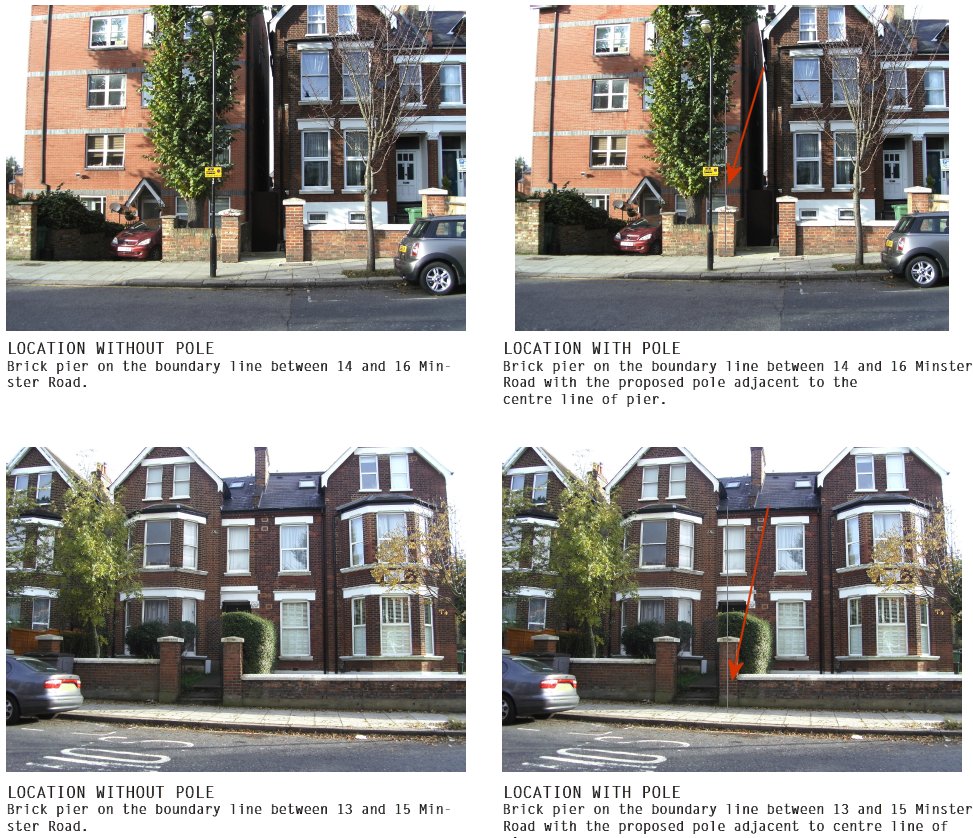
Minster Road (arrows added)
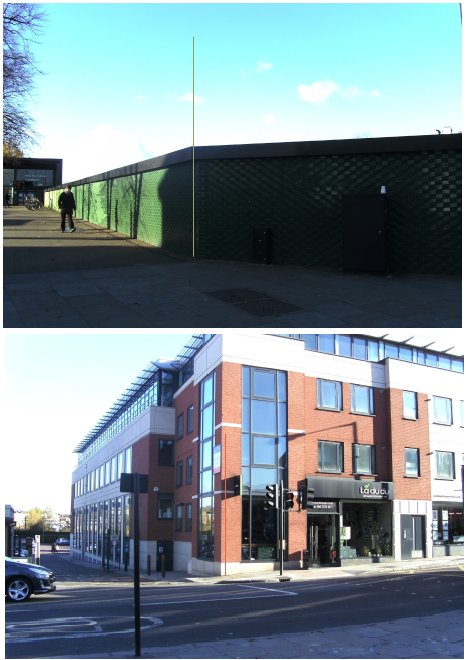
Poles spanning West End Lane (green by the wall, red by the building)
The topic came up a couple of years ago when there was a proposal for a Camden eruv, which would also have included West Hampstead. This Brondesbury eruv was itself mooted as far back as 2010. To non Jews, it can seem an astonishingly arcane concept, and eruvs don’t have universal support even among Jews. One of the things that some people find strange about an eruv is that it has to be physically demarcated. This can be (and largely is) done using existing walls or boundaries but where that is not possible, then tall poles are usually erected with wire strung between them. These are required for fairly complicated reasons relating to the separation of different realms and each set of poles and wires physically represents a doorway.
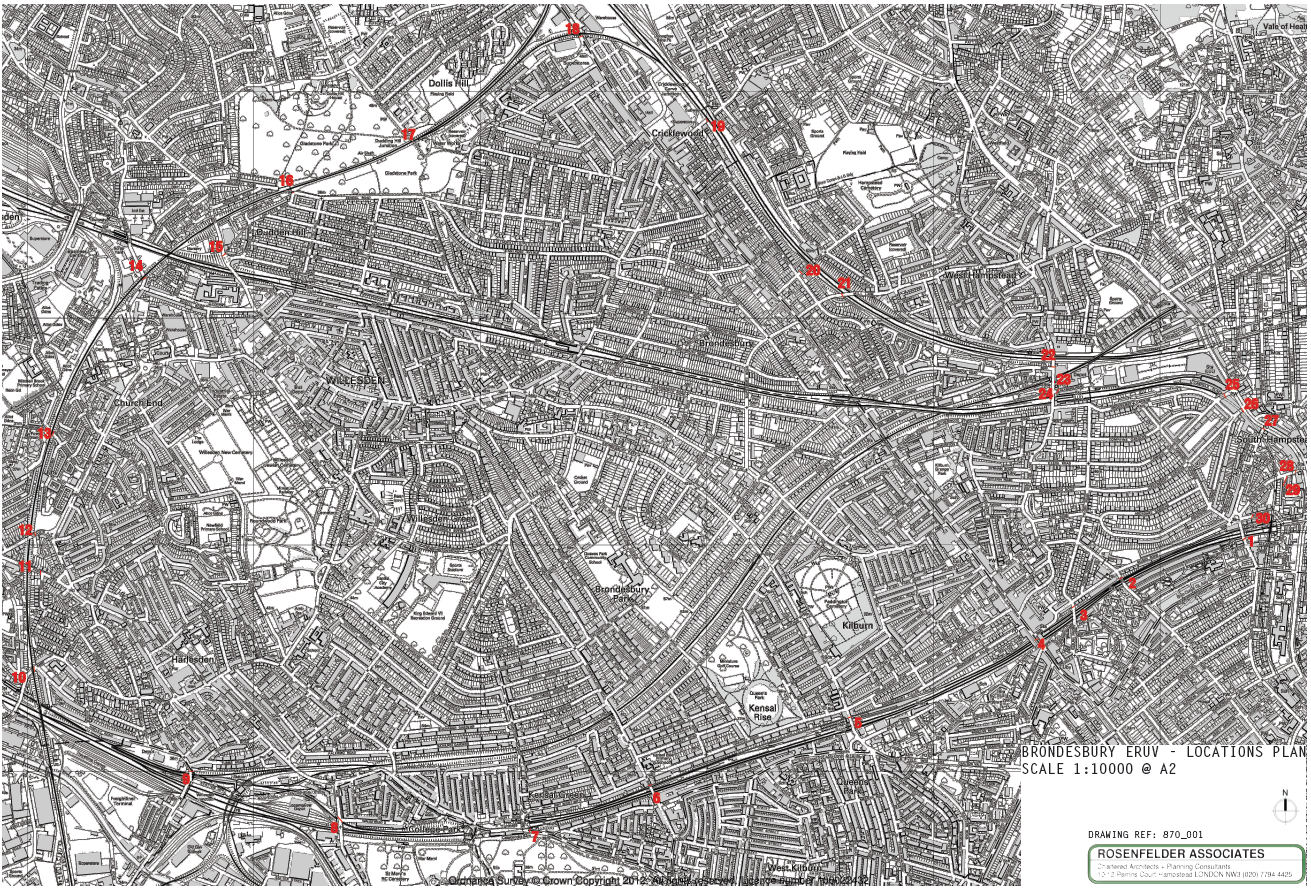
Map of the whole eruv (click for larger version)
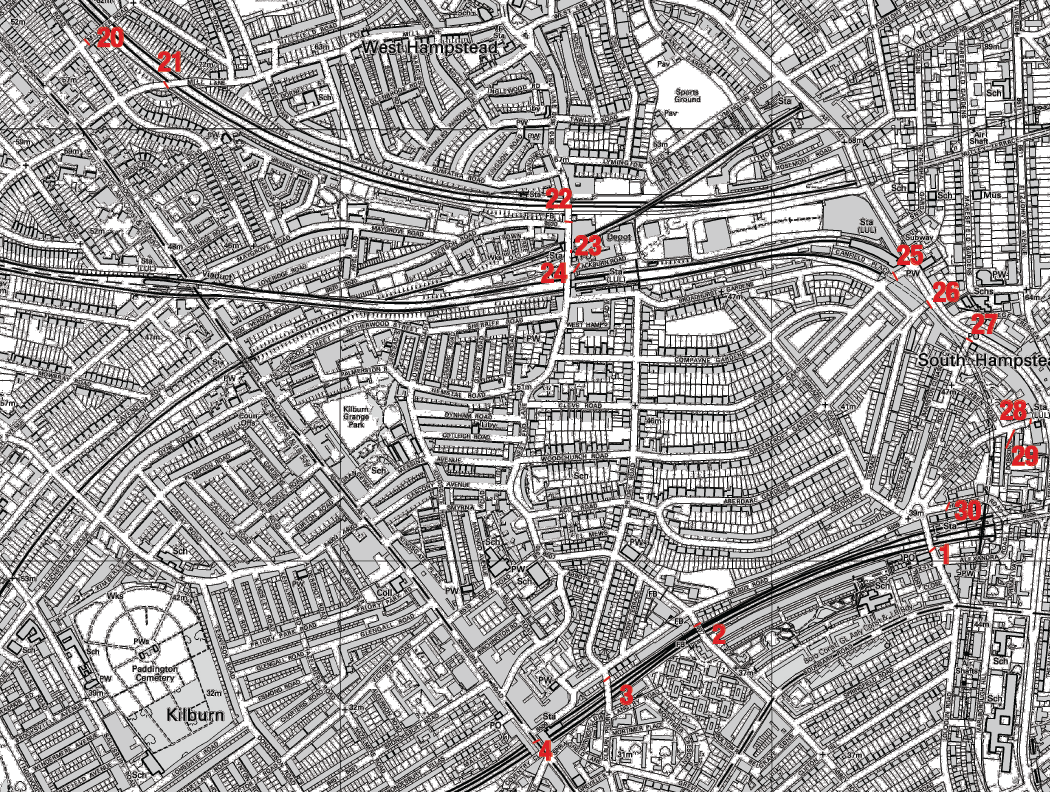
The detail in West Hampstead & Kilburn
It is the construction of these poles and wires that tends to bring the issue to the attention of the wider community as, in the UK at least, this requires the support of the local council. Jewish communities always pay for any work required but, unsurprisingly, non-Jewish residents can find it rather odd to have wire that has absolutely no significance for them strung up in their streets. If you’re not a religious person, then it’s really just street furniture. Eruv supporters will tend to argue that the poles and wires are very unobtrusive.
You can read a lot more about eruvs on Wikipedia, more than you probably want to know – such as that even with an eruv, you can’t open an umbrella on the Shabbat or that there appears to be a long-running debate as to whether the entire island of Manhattan is an eruv. It is precisely those sort of peculiar laws that distance orthodox followers of any religion from the mainstream – whether religous or secular.
Not all Jews automatically support the creation of an eruv. For liberal Jews it’s meaningless as they do not abide by Orthodox laws. Some also argue that it might be time to question the underlying principle. A letter sent to the Camden New Journal by a non-Orthodox Jewish resident of Hampstead suggests campaigning “for these Sabbath laws to be more flexible and take people’s individual needs into account. I would also point out that when these laws were instituted neither insulin nor wheelchairs existed.” Nor are the details of how they are created unanimously agreed on. According to the BBC, “The Union of Orthodox Hebrew Congregations (UOHC) – which includes synagogues in north-west London – has claimed that there are “serious halachic (Jewish law) problems” with the North West London eruv that make it invalid.”
The planning documents are all large files, but we’ve taken the pages that refer to the West Hampstead & Kilburn locations and merged them into one document, which you can view here (or look at below if your browser supports it).
Brondesbury Eruv – the West Hampstead and Kilburn locations by WHampstead
[print-button target=’div.entry-content-wrapper.clearfix.standard-content’]


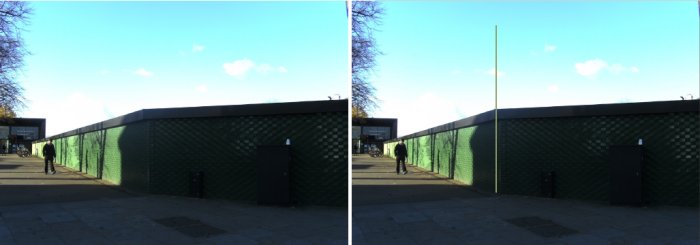


I hope that Camden will reject this and I will certainly be objecting to it. This isn’t just about whether the poles are unsightly or not – there are far more important issues at stake here.
Is it right to condemn a disabled person for using a wheelchair on the sabbath? Is it right to prevent a mother carrying her baby? Should a diabetic be criticised for carrying essential medicines? I would imagine most people of all religions would say no to the above. Yet by approving the eruv the council would be condoning and giving unique significance to these beliefs.
Those that are seeking to build the eruv could make it clear that no one should be condemned or criticised for carrying medicines or crutches. Instead they’re seeking a public validation.
I do agree that everyone has the right to believe in whatever they wish (as long as those beliefs don’t harm other people). But no one has the right to impose their beliefs on the public sphere which includes building on public land.
I can’t believe this would be acceptable to most people or to Camden. We live in modern times where rights are inherent and unconditional and shouldn’t be favoured to those who live in the correctly demarcated area. We live in a shared community where one faith shouldn’t be given preferences. It’s a medieval idea that deserves to be called what it is.
A remarkably clear description of a fairly complex subject. Good work Jonathan!
The truth about Eruvs is that they have no negative impact on the people who don’t use them, and are hugely beneficial to those that do.
The idea that people who wouldn’t ordinarily observe these laws might suddenly be compelled to really does not match with the reality of the Eruvs that have now been installed in London. They are so unobtrusive that you really wouldn’t notice them if you didn’t know they were there.
I am a little disappointed with some of the other responses that seem to suggest that the mere notion of a few poles and wires means that West Hampstead is on the verge of becoming some sort of wild-eyed theocracy.
Genuinely, I would recommend that anyone who is concerned goes and meets the local Orthodox Jewish population – a genial bunch. I think you will be quickly reassured that this is not any sort of threat to the identity and diversity of the place. If anything it will only enhance it.
You say they have no negative impact – but the photos show that several of the poles will be in very prominent positions and will add to street clutter. Added to the inevitable disruption then the poles are installed / maintained and I don’t think you can say there is no negative impact – although I admit the physical impact is small.
Far more signficant is the symbolic impact. Clearly for the proponents these poles are important for what the symbolise. Can you understand that for opponents they have great symbolic importance as well? For many people, giving permission for these structures on public land would go against a matter of important principle.
I would be interested to know whether you, Phil, believe that telling people they shouldn’t carry essential medicines or push wheelchairs is a reasonable thing to do?
I have emailed the local synagogue to get more information on why they feel an eruv is necessary, and would be happy to meet, but so far haven’t received a reply.
Nobody is TOLD not to do anything – it is what one chooses to do on the basis of the religious laws which, in the eyes of the believers, were laid down by G-d. The fact is that these “laws”, written many thousands of years ago, do not get changed to account for progression in the world. What one chooses to do is up to them and having the Eruv simply means that those who already adhere to these “laws” have an easier life.
Yours and nobody else’s concerns or protestations about who can or cannot carry/push etc will never change. If anything, the Eruv is a modern solution to an old problem and should perhaps be more embraced as progression. The Eruv acts as a symbolic walled city in which (Jerusalem) Jews can carry/push etc on the Sabbath.
So people *are* told what to do by these religious laws which are in turn interpreted by human beings. My understanding is that the rules themselves are highly complex and most followers therefore rely on what their faith leaders and their community says is and isn’t acceptable behaviour.
Many (most?) Jewish communities interpret those rules differently and would find it acceptable to carry a baby or insulin on the Sabbath. It’s only in certain communities that these extreme restrictions are adhered to. The considerable energy going into building the eruv could instead go into changing the attitudes within those communities which would help far more people.
Of course, people have the right to hold whatever views the wish – even extreme ones provided they don’t hurt other people. But I don’t want my local council to support and encourage those extreme views.
Not at all Nathan. I’d share your concerns if anyone was being forced or told not to carry against their will. That is not the case and framing the issue like that is hysterical and alarmist.
This proposal will only help those that want to observe these restrictions to be able to do so more easily. It doesn’t impact on those that don’t.
Frankly if you don’t practice this religion (or do practice but not these specific laws) then it does not affect you. Arguing to block it is simply a spiteful action against those that do.
Glad someone else tried to explain this, though I doubt it will get through. This is about a religion, not a sect or a group of fanatics. Anyone involved in the religion is always free to practice what works for them and nobody will ever think worse of you for that. I personally think it is ridiculous and no doubt so do many others. In many ways the creation of an Eruv with fishing line is a “sham” to twist/bend the rules but at least it is a nod to carry on the traditions that have existed for thousands of years. Erode this element of one of the 10 commandments (it is about having a day of rest – the fourth commandment, and carrying something used to signify “working”) and then erode another and another and eventually the religion fades into non-existence and that is the worry for many. It may sound odd, and unfair to compare it, but there are ramps everywhere for wheelchair users, bobbled pavements for blind people, banisters for old people and perhaps invisible wire on a few poles for Jewish people. Who REALLY cares or just hasn’t got anything better to do than object?
> “This is about a religion, not a sect or a group of fanatics”
I think this gets to the heart of the issue. The objection from secularists is precisely that these ideas – however ridiculous (as per your description) – – seem to get special status just because they come from a religion.
I’m not sure the distinction between a religion or a sect is a great as you think and as for fanaticism. Do you not think that telling a parent of a new-born then can’t carry their baby to their neighbours house is pretty fanatical?
Nathan, I understand (and I support) your wish for secularist freedoms for people to do as they wish. Again lets not confuse anyone here, as nobody is being asked to do anything they don’t want to do.Don’t imagine that the ultimate aim of Judaism is to foist their views on others. Unlike Christianity or Islam, Judaism is in not evangelical. They hold no belief that non-believers are going to hell or hold any threat to themselves. So why should the secular feel threatened by them? The link you found is about the ultra religious Jerusalem neighbourhood that would want to be kept separate from the rest of the (extremely) secular rest of Israel on the Sabbath. There is none of that here. I’m sure the London Jewish community are glad of that!
You misunderstand the concern secularists have. Our fear is not that huge waves of people are going to be converted to religion – indeed all the evidence is that (in the UK at least) religion is very much on the decline.
http://www.bbc.co.uk/news/magazine-12507319
http://d25d2506sfb94s.cloudfront.net/cumulus_uploads/document/2l6avzlerp/Religion.pdf
Our concern is rather that beliefs which would in any other context be regarded as offensive or ridiculous – are given special privalege and power simply because they are religious.
When a taxpayer funded school edits exam questions to remove references to evolution that matters to all of us.
http://www.theguardian.com/education/2013/oct/11/jewish-school-censored-gcses-evolution
Just because all the pupils in the school are of one faith doesn’t mean it’s not a matter of great concern.
Again – I accept people’s right to believe what they want (even in creationism) – but don’t want those beliefs being given special power in the public sphere.
So sorry for misunderstanding. How silly of me.
Just wondering if you will be deciding what beliefs are “offensive or ridiculous” or whether you’d prefer to leave that role to the neo-Nazis as has been so long the tradition in history?
It must be so hard for you. So many varied views and opinions that don’t all concur with you world outlook. So very “offensive”. Nasty minorities eh… Nasty.
Oh dear. I thought we might actually manage to have a sensible discussion but then the Nazi slurs come out. How sadly predictable. Since we’ve proved Godwin’s law I think it’s time to bring this to a close.
But just to clarify – “ridiculous” was the description used by MyFrisbee not me.
And my whole point is I that don’t think anyone (not me, not the council, not the government) should be deciding which religious beliefs are “ridiculous” and which are not. If we agree on that point then there are only 2 logical options. Either we respect all faith-based positions from every ancient animist to new age sect – in which case anyone can demand anything, call it their religion and it will go unchallenged. Or we keep religion out of the public sphere, say the people are completely free to believe whatever they want, but not expect to have those beliefs accorded special rights – which is what I propose.
Spectacular ability to miss the point. I’m not accusing you of being a Nazi Nathan. I’m suggesting that it is just as arrogant of you to prohibit a practice as you judge another person’s belief as offensive to you because you don’t agree with its premise. It doesn’t affect you.
As for your implication that the local authority should not approve this because you don’t want them to endorse these beliefs. What makes you think that is their role. That they are to represent and facilitate the majority secular lifestyle at the expense of all other beliefs! You are arrogant. Should the uk refuse gay pride decorations or xmas lights on regent st? No public funds are being requested in this case. I would expect most people will see through your objections. You seem hateful to me.
As I say, I’m happy to debate rationally. But when it becomes a matter of hurling personal insults I’m out. G’night.
Personal insults are not intended that way. But you write the words so your motives will be speculated on. I hope I’m wrong about you. Good night
Well it didn’t take much googling to find examples of exactly that – people being forced to obey these laws. Just one of many links:
http://judaism.about.com/library/1_politics/bl_ultraorthodox_jerusalem.htm
Of course – I’m not for a second saying that this sort of thing will happen here. But can you really say that within the community there is no social pressure to adhere to these rules – that the views of the rest of the community don’t in any way enter into a new parents decision on whether they can carry their baby to a friends house? I find that pretty hard to believe.
And to say that any objection is done out of spite is very offensive. Your whole argument is based on the fact that these poles – of no material significance – have to some people huge symbolic significance. To secularists – giving special approval to particular religious beliefs is also very significant. These are honestly held views that a truly secular society is a happier better one. You may not agree with those beliefs but please don’t say that they are held out of spite.
No thanks – and that’s from someone who is (fairly deracinated) a Jew. It sounds reasonable and probably is. But allow this and next thing another religious group will demand its own ‘favour’ that is rather less reasonable – just look at the attempt by some extreme Muslims to ban alcohol sales in Brick Lane. That’s very different some might argue but that will cut little ice with those wanting a favour in return. Secular society must be defended
I agree that this should be rejected.
I can’t see an actual map of the eruv’s boundary (even on the Camden website), but inferring from the poles’ locations, it seems as though the eruv wouldn’t contain JW3, the Jewish Community Centre on Lymington Road / Finchley Road. That seems odd?
There is a map in the article above, or you view it here: http://westhampsteadlife.com/wp-content/uploads/2014/06/Brondebsury-Eruv-map.png but no, it doesn’t contain JW3.
Ah I saw that, but just saw train lines… in hindsight it’s sensible that the boundary is the same, if it’s a continuous built up object. All interesting.